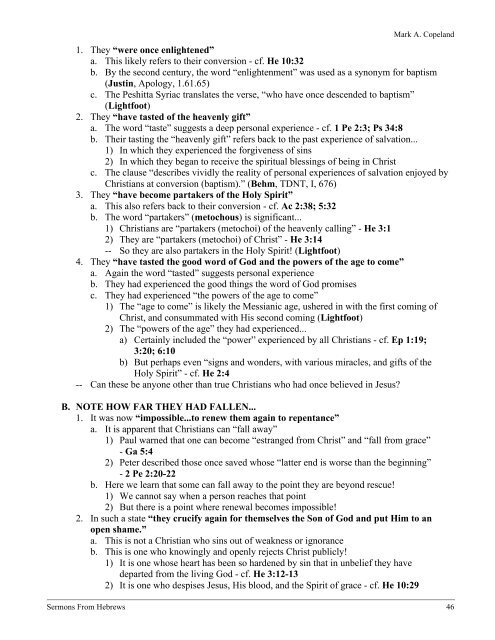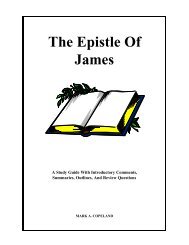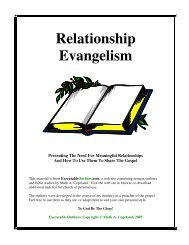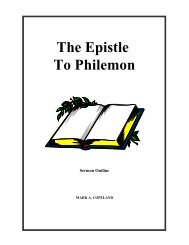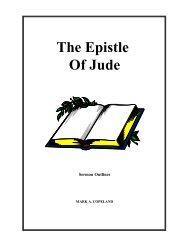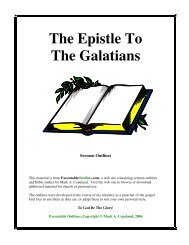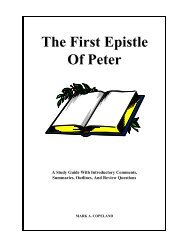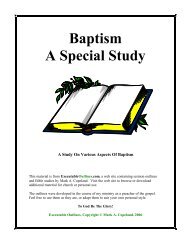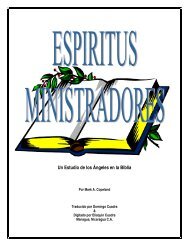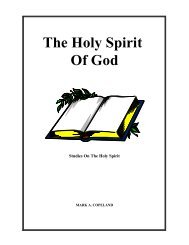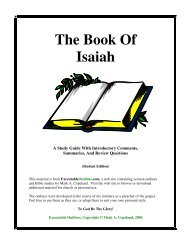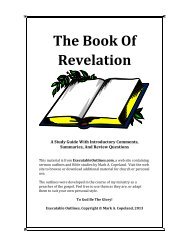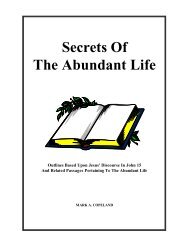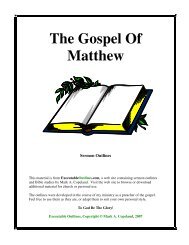The Epistle To The Hebrews - Executable Outlines
The Epistle To The Hebrews - Executable Outlines
The Epistle To The Hebrews - Executable Outlines
You also want an ePaper? Increase the reach of your titles
YUMPU automatically turns print PDFs into web optimized ePapers that Google loves.
Mark A. Copeland<br />
1. <strong>The</strong>y “were once enlightened”<br />
a. This likely refers to their conversion - cf. He 10:32<br />
b. By the second century, the word “enlightenment” was used as a synonym for baptism<br />
(Justin, Apology, 1.61.65)<br />
c. <strong>The</strong> Peshitta Syriac translates the verse, “who have once descended to baptism”<br />
(Lightfoot)<br />
2. <strong>The</strong>y “have tasted of the heavenly gift”<br />
a. <strong>The</strong> word “taste” suggests a deep personal experience - cf. 1 Pe 2:3; Ps 34:8<br />
b. <strong>The</strong>ir tasting the “heavenly gift” refers back to the past experience of salvation...<br />
1) In which they experienced the forgiveness of sins<br />
2) In which they began to receive the spiritual blessings of being in Christ<br />
c. <strong>The</strong> clause “describes vividly the reality of personal experiences of salvation enjoyed by<br />
Christians at conversion (baptism).” (Behm, TDNT, I, 676)<br />
3. <strong>The</strong>y “have become partakers of the Holy Spirit”<br />
a. This also refers back to their conversion - cf. Ac 2:38; 5:32<br />
b. <strong>The</strong> word “partakers” (metochous) is significant...<br />
1) Christians are “partakers (metochoi) of the heavenly calling” - He 3:1<br />
2) <strong>The</strong>y are “partakers (metochoi) of Christ” - He 3:14<br />
-- So they are also partakers in the Holy Spirit! (Lightfoot)<br />
4. <strong>The</strong>y “have tasted the good word of God and the powers of the age to come”<br />
a. Again the word “tasted” suggests personal experience<br />
b. <strong>The</strong>y had experienced the good things the word of God promises<br />
c. <strong>The</strong>y had experienced “the powers of the age to come”<br />
1) <strong>The</strong> “age to come” is likely the Messianic age, ushered in with the first coming of<br />
Christ, and consummated with His second coming (Lightfoot)<br />
2) <strong>The</strong> “powers of the age” they had experienced...<br />
a) Certainly included the “power” experienced by all Christians - cf. Ep 1:19;<br />
3:20; 6:10<br />
b) But perhaps even “signs and wonders, with various miracles, and gifts of the<br />
Holy Spirit” - cf. He 2:4<br />
-- Can these be anyone other than true Christians who had once believed in Jesus?<br />
B. NOTE HOW FAR THEY HAD FALLEN...<br />
1. It was now “impossible...to renew them again to repentance”<br />
a. It is apparent that Christians can “fall away”<br />
1) Paul warned that one can become “estranged from Christ” and “fall from grace”<br />
- Ga 5:4<br />
2) Peter described those once saved whose “latter end is worse than the beginning”<br />
- 2 Pe 2:20-22<br />
b. Here we learn that some can fall away to the point they are beyond rescue!<br />
1) We cannot say when a person reaches that point<br />
2) But there is a point where renewal becomes impossible!<br />
2. In such a state “they crucify again for themselves the Son of God and put Him to an<br />
open shame.”<br />
a. This is not a Christian who sins out of weakness or ignorance<br />
b. This is one who knowingly and openly rejects Christ publicly!<br />
1) It is one whose heart has been so hardened by sin that in unbelief they have<br />
departed from the living God - cf. He 3:12-13<br />
2) It is one who despises Jesus, His blood, and the Spirit of grace - cf. He 10:29<br />
Sermons From <strong>Hebrews</strong> 46


